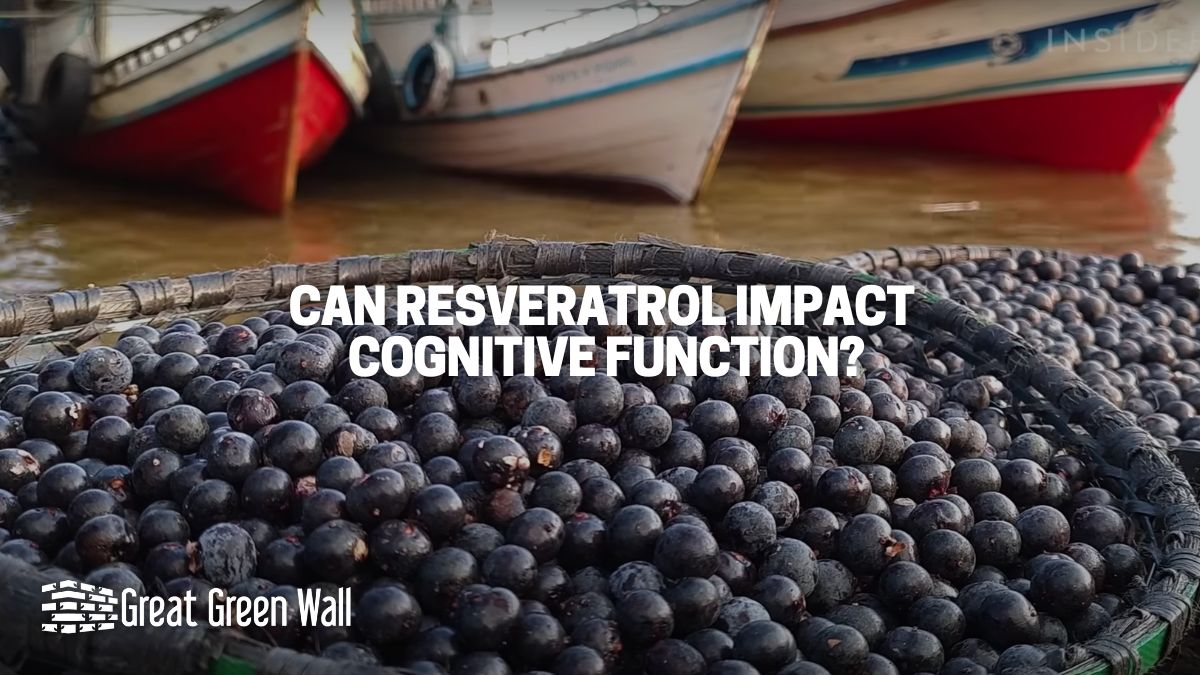Sometimes in science writing, I get a little lucky. That is to say, I find a gold-mine of data that is interesting to read, and just so happens to answer some readers’ questions about a newsworthy supplement or ingredient. That was the case recently when someone asked me to look into Resveratrol and cognitive performance.
I’ve looked through some of the cutting edge research going on with this plant compound and come up with some definitive data, some conflicting data, and some plain interesting data.
Key Takeaways
Leading Research
Resveratrol has been researched for many years now, given its presence in so many foods, and how quickly and easily it is digested into the body. Some of the best evidence has shown that Resveratrol can help with neuron protection, the reduction of reactive oxidation in the brain, and even with the inhibition of β-Amyloids (a leading cause of Alzheimer’s).
Some of the oldest research into Resveratrol was, understandably, on laboratory animals. That research found that this plant compound can retain brain fiber density and cognitive function in mice, and that the mechanism was through increasing blood flow in the brain.

Newer and More Exciting
Here we come to some of the most exciting research I’ve seen into cognitive function. Generally speaking, when studying the current science around nootropics, I’m left with one of three alternatives: ingredient A might have Effect Z, which could impact cognitive performance, but no studies show that; ingredient A has a specific brain impact, but no studies exist on actual cognitive performance; or ingredient A does have Effect Z, but we don’t know why.
With Resveratrol, we’ve hit the trifecta. In a remarkable study published in the Journal of Neuroscience, researchers found:

In short, these researchers saw a cerebral effect, saw better cognitive performance, and linked both directly to Resveratrol. The study had all the hallmarks of a rigorous trial–double blind, placebo controlled, 26 weeks long, and 23 participants per group.
Even more exciting, a separate team of researchers repeated many of the same results in a different, larger study. In this trial, over a hundred older women were studied over 12 months. The test group had not only significantly better cognitive performance, but researchers again saw a link between improved cerebral blood flow resulting from stimuli, and again linked it to better blood-sugar levels–all related to taking Resveratrol.
This second team took things a step further, they extended their study to another 12 months as a “crossover study” (where they switched the placebo and test groups). Their results were the same, and with greater statistical data, they were able to determine that Resveratrol increased cognitive performance by over 30%.
A Note On Blood Sugar and Brain Health
Not all of the mechanisms are clear, but recent data show a strong correlation between diabetes, high glycosylated hemoglobin (known as A1C), and mental decline. The mechanisms of this are still being researched, but the data are close to forming a causal relationship. Inversevely, researchers have found that lowering A1C can improve mental function, further advancing the theory that one greatly impacts the other.

Conflicting Data
Before we start throwing confetti and investing in Resveratrol companies, we do need to take a look at the conflicting data. All of the next three studies are older than the ones discussed above, but that doesn’t discount their data.
Interestingly, all three of them found the same biochemical and physiological effects of Resveratrol–they just didn’t see the same cognitive performance increases.
In the first, researchers tested the overall blood-flow hypotheses, this time in obese adults who were otherwise healthy (no cognitive decline, heart disease, or diabetes). They did indeed find significant and acute increased blood flow with Resveratrol, but they did not find cognitive function increases. They used a standard color/word test that many cognitive researchers have relied on, but only that one metric.
The next study looked at healthy, younger humans (as opposed to those older than 65 as our previous studies). Their test outcomes were specifically cerebral blood flow, and three cognitive performance tests. Results were positive for increased blood flow, but on the performance, they found slower but more accurate responses after one day of Resveratrol; after 28 days, the Resveratrol group had better scores on only one of the three tests. Their data is not publicly available, but they said of their results that they had a “lack of interpretable cognitive effects.”
Lastly, we have a study looking at the effects of brain health, blood sugar, and memory in the elderly. Their data showed positive results for Resveratrol and lowering blood sugar, preserving brain mass–but not in improving cognitive performance.
Conclusion
Many times in my science writing career I’ve been frustrated by conflicting data. This is usually because one study is funded by a large corporation, or another study is riddled with flaws. But in this case, the conflicting data actually points us to further research to come, which can be quite exciting. All of the data we have is sound, and the studies well-run.
Furthermore, the mechanisms elucidated in each study are holding steady, even in conflicting data sets. That means that we have a stronger indication that the cognitive performance fluctuations are not due to the Resveratrol itself, or its functions, but rather due to some other issue. Put another way, researchers showing cognitive performance increases are not wrong, despite the contradictory evidence, because all test subjects are seeing better brain flow and lower blood sugar.
It may yet only be a matter of time before a larger battery of more standardized tests can more clearly show a correlation between Resveratrol and not only bio-mechanisms, but cognitive performance, as well. Because the bio-mechanisms are at this point fairly well established.
Related Articles:

